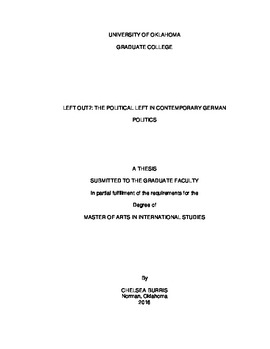| dc.contributor.advisor | Smith, Mitchell | |
| dc.contributor.author | Burris, Chelsea | |
| dc.date.accessioned | 2016-07-21T20:44:33Z | |
| dc.date.available | 2016-07-21T20:44:33Z | |
| dc.date.issued | 2016 | |
| dc.identifier.uri | https://hdl.handle.net/11244/44225 | |
| dc.description.abstract | This thesis argues that the left wing in Germany is primed to form a governing coalition in Germany following ten years of center-right rule. Thuringia is the case study within this paper because of the unique position of the Left Party in that state that is different from its place in any other part of Germany. The Left Party in the state of Thuringia is the senior partner in a coalition with the Social Democratic Party (SPD) and Alliance90/the Greens, the first time the Left Party has led a state government in the Federal Republic. This also unites all three left of center parties.
This thesis looks at the current government in Germany and the left-wing’s reaction to ten years of center-right power. In order to do so, I look at the potential impact of a left-wing government on the state level on political taboos in Germany and the ways that the SPD and Greens have reacted to current issues in German politics. The SPD and the Greens are also both experiencing a change in their electoral fates. These parties are more successful on the local and state levels than nationally at present, but this could change as the Left Party and the right-wing Alternative for Germany (AfD) forces changes in the political landscape. Amid media claims that Angela Merkel and her governing coalition are vulnerable due to their approach to the refugee crisis, which has been unpopular among many Germans, I argue that a left-wing coalition could be the answer in the future.
The Left Party’s power in Thuringia is vital to the future of the Left Party, as it shows that that party is able to govern fairly and in a democratic system and may help to repair this party’s image nationwide. The left wing represents an important alternative to right-wing populism in Europe. This is important for the future because Germany is a leader in the European Union. As seen with the refugee crisis and rise of far right populism, when things change in Germany, consequences may be felt throughout Europe. | en_US |
| dc.language | en_US | en_US |
| dc.subject | Political Science, International Law and Relations. | en_US |
| dc.subject | German Politics | en_US |
| dc.subject | Thuringia | en_US |
| dc.title | Left Out?: The Political Left in Contemporary German Politics | en_US |
| dc.contributor.committeeMember | Pearson-Patel, Jessica | |
| dc.contributor.committeeMember | Raymond, Mark | |
| dc.date.manuscript | 2016-06 | |
| dc.thesis.degree | Master of Arts in International Studies | en_US |
| ou.group | College of International Studies | en_US |
